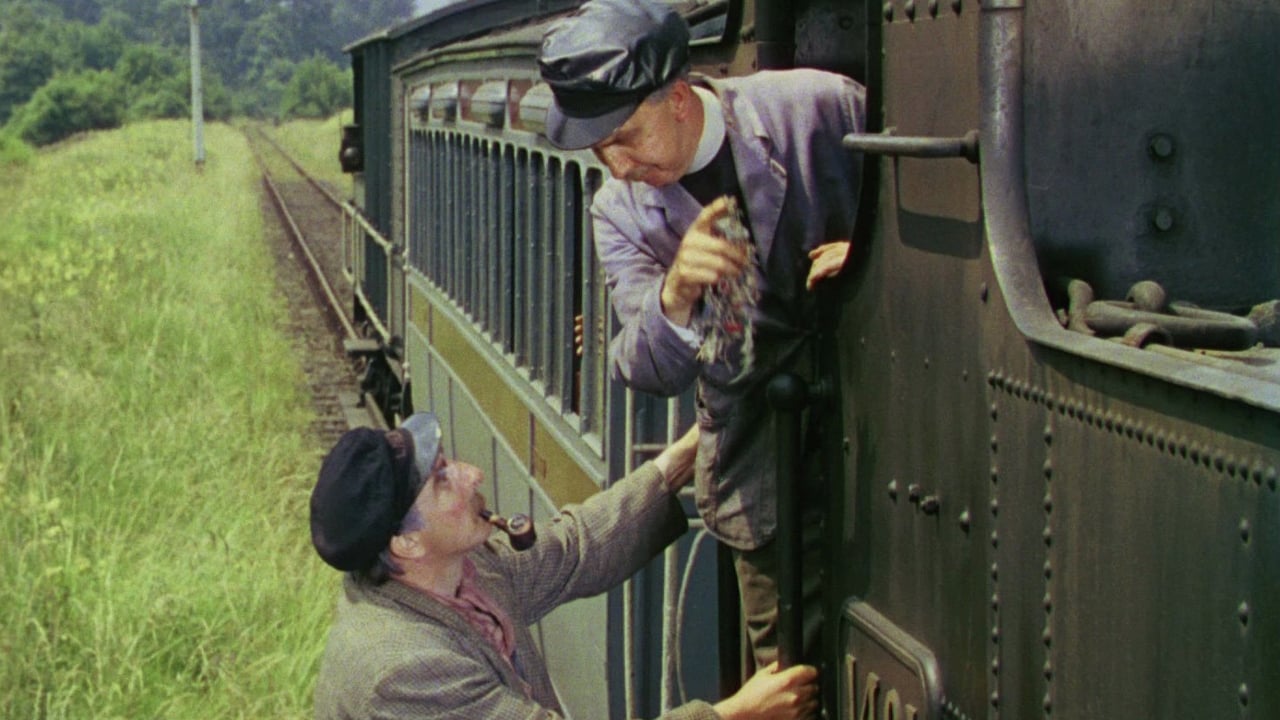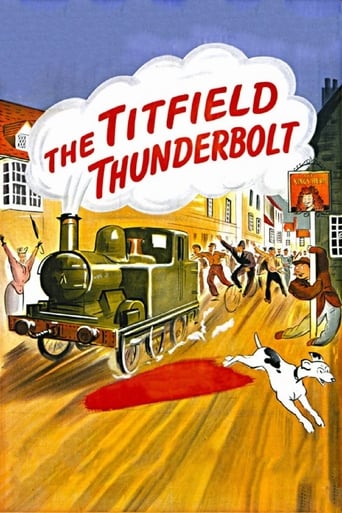

Made ten years before the Beeching report yet seems to predict it. I showed this film to a Danish friend after playing 'The Blue Lamp'. He chose this as the better film.
... View MoreTHE TITFIELD THUNDERBOLT played a few 'art houses' in the U.S.A. when it came out, but I, at 14, missed it in its short New York City run, and have finally caught up with it. There is no need to rave about it here, because most of the other reviews printed here do so more than adequately, and I totally concur with the most positive of those reviews. There are so many wonderful character actors/comedians in this film that unless you rave about all of them, you are in danger of grievously insulting that one or two you leave out. However, only one other reviewer has mentioned a 'little' performance in this film - it runs no more than a minute - which had me reversing the film about four or five times to see it over and over again, and that is the performance of an unnamed policeman by actor Wensley Pithey. Unadulterated Anglophile movie-lover that I am, I cannot recall his name at all, yet he seems to have had some notable success as, if no one else, Winston Churchill in several outings as that wonderful man. Here, he almost steals the film (at least, for me) as a policeman who has just arrested Stanley Holloway and Hugh Griffith for stealing a railroad engine and running it through all of Titfield to a final crash, and when asked what he is charging them with, breathlessly rattles off a litany of charges that are almost awe-inspiring to the viewer. If he did not have the 1953 version of a teleprompter in front of him, it is amazing that the actor could even have memorized such a plethora of legally questionable activities. It's kind of like a shorter comic version of Edward G. Robinson's speech in DOUBLE INDEMNITY on all the ways to commit insurance fraud, or for something more classical in nature, Oscar Wilde's Herod spewing forth his huge list of things he will give Salome in preference to providing her with the only thing she really wants - John the Baptist's head. This may not be one of the defining moments of British screen acting, but having been watching films for a good 70 years without recognizing him, I will now remember Wensley Pithey's name forever (well, for however long my particular forever may last). Bravo for British Acting and, in the absence of a teleprompter, the memorization techniques endemic to the acting profession.
... View MoreCharming and quaint are words often associated with Ealing Comedies as well as having a streak of anti-establishment.During the days of the nationalisation of the railways this is a film of a romantic bygone age but its less successful more known for its nostalgia than substance.Some of the locals with the financial help from the squire who has been promised early morning booze on the train rally around to take over the local branch line which is being closed down by British Rail.The local bus company is none too pleased and plotting to derail the project.With all the skullduggery, some of the villagers try to convince the government inspector that the branch line should be run permanently by them.There are times the locals appear from nowhere to keep the locomotive going but given Naunton Wayne the town clerk discovers that the bus company have been up to no good he does little to grass them up to the government inspector.Its sporadic fun with enough local colour such as the enthusiastic vicar, the poaching engine stoker, boozy squire but the script never catches speed.
... View MoreWatching The Titfield Thunderbolt I'm wondering if Paul Henning got the idea for Petticoat Junction from this film. Certainly the folks who wanted to keep that railroad that ran from Hooterville to Pixley were of the same mind that these rural British people had in keeping their railroad line operational.On Petticoat Junction that was a running plot line to keep the Hooterville Cannonball going. Here in Titfield the main transportation with the outside world is that railroad that runs from Titfield to Mallingford and back. The Labour government under Clement Attlee in the new post war Great Britain nationalized their railroads, but a loophole in that law will permit a private company to be organized if they can maintain the railroad up to certain standards.Now that's not sitting too well with folks that have franchised a bus line to be the new transport between Titfield and the wider world. So now we also have the elements of the plot of hundreds of westerns in the USA, the railroad versus the stagecoach. This one's done with a little more style.It's quite a crew of outraged citizens from Titfield that have taken this crusade up for many different motives. They range from the local vicar George Relph to the local squire Stanley Holloway to the local poacher Hugh Griffith. The ingenuity of the locals is really something to see as they overcome many disadvantages and some deliberate sabotage.The cinematography of the British countryside by their ace cameraman Jack Cardiff reminds me of The Quiet Man. Another reminder of The Quiet Man is the presence in the cast of Jack McGowran of the Abbey Theater players. You might not remember the name, but you can never forget McGowran who plays a toady like character here for the bus line in the same manner he was Victor McLaglen's factotum in The Quiet Man. With that squinty face of his, McGowran was born to play parts like that.The Titfield Thunderbolt both as a period satire of some of the problems that the new Socialist Great Britain was undergoing and as a comedic piece with some timeless comedy gags holds up well. It's a great credit to the Ealing Studios and the wonderful humor that they gave the post war United Kingdom and the world.
... View More